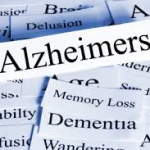Summary: While there is no cure to date for Alzheimer’s, there are several proactive steps you can take to reduce or prevent the effects of this disease. Do you know what the symptoms are? Do you know where to find additional information?
Summary: While there is no cure to date for Alzheimer’s, there are several proactive steps you can take to reduce or prevent the effects of this disease. Do you know what the symptoms are? Do you know where to find additional information?
Alzheimer’s disease is a form of dementia in which there is an increase in memory loss over time, sometimes to the point in which daily activities such as bathing, eating, and brushing your teeth are not possible without assistance. For some this disease progresses very quickly, for others it takes many years to fully develop. Are there any ways to try to prevent or limit the severity of the symptoms?
There are 5 ways to try to prevent Alzheimer’s disease:
- Increasing exercise – Exercise, specifically aerobic exercise, can help prevent Alzheimer’s disease. Increasing the heart rate and increasing the flow of oxygen throughout the body and mind can help reduce the likelihood or reduce the severity of the symptoms attributed to Alzheimer’s.
- Increasing sleep quality and sleep hours – There has been a link detected between sleep disorders such as Sleep Apnea which can be attributed to Alzheimer’s. Studies show that adults should have about 7-9 hours of quality sleep. Lack of sleep has many negative effects on the body and mind. Good, solid sleep is essential as it allows the mind the opportunity to rejuvenate and rest.
- Revising nutritional behaviors – Good nutritional habits serve both the body and mind. Alzheimer’s has been found in some studies to be linked to other diseases such as heart disease and diabetes. Eating in a heart-healthy way can help to prevent the onset of this disease as well.
- Keeping mentally active – Keeping the mind active involves stimulating the brain by trying and learning new things. Some of these new activities may include learning to paint, enjoying a new hobby, or different brain activities such as math or word problems. The essence of this element is engaging in new activities rather than doing the same activities you have for years.
- Reducing stress – Stress is part of our everyday life. Stress cannot be totally avoided, but participating in things such as yoga and meditation may help in managing stress.
Facts and stats surrounding Alzheimer’s:
- Alzheimer’s is an old age disease – myth – Alzheimer’s has been diagnosed in younger populations (40-50 years of age) and has been
 identified and carved out as “younger-onset”.
identified and carved out as “younger-onset”. - Alzheimer’s is a progressive disease and the symptoms intensify over time.
- Alzheimer’s is the 6th leading cause of death in the US.
- While there is no current cure for Alzheimer’s, there are treatments for some of the symptoms. Research is being conducted round-the-clock to find a cure and hopefully a breakthrough will come quickly.
- The most common early detection symptom is difficulty remembering newly learned information. Short term memory loss generally precludes long term. Many times, those with Alzheimer’s remember events in their childhood but cannot remember what they did today. Some other symptoms may include: disorientation, mood and behavior swings, increased confusion about recent events, time, and place, suspicions about family, friends and caregivers, more serious memory loss and behavior changes, and difficulty swallowing, speaking, and walking.
If you are experiencing any of these symptoms, it is recommended you see your doctor. To find a local Alzheimer’s Association chapter, please click the following link. http://www.alz.org/apps/findus.asp



 identified and carved out as “younger-onset”.
identified and carved out as “younger-onset”.




